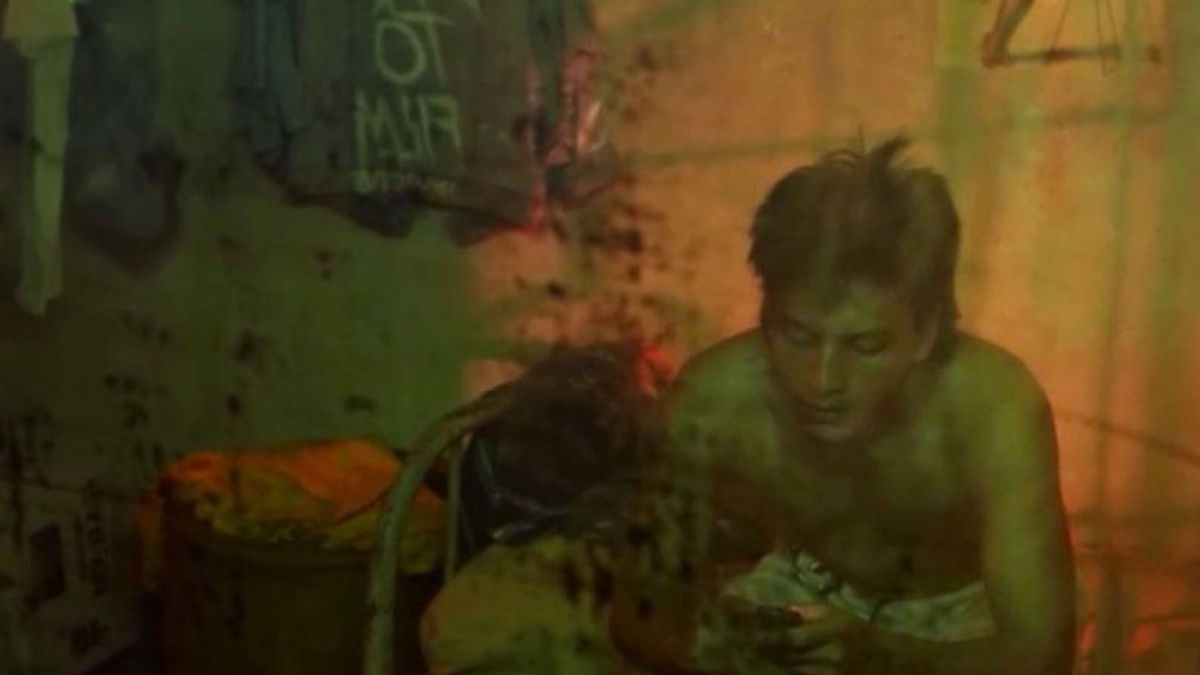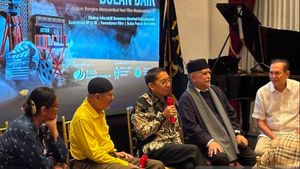JAKARTA - His name is Dom (Jefri Nichol). Originally from Padang. He has been living in Jakarta for a long time. When people asked about his work, he calmly and seriously replied: "Actor."
Pinkan (Wulan Guritno), a woman he just met at the mini market, responded with disbelief. Ratih (Jajang C. Noer), a mother who rents out a room in a flat, laughs when she hears Dom's confession.
Except for Khansa (Dea Panendra), a drug user who met in the train carriage, she responded to Dom with relaxed gestures, as if she didn't care what the man said, who was on the verge of nonsense and sincerity.
But that's how it is in Jakarta – everyone has the right to dream. Director Ertanto Robby Soediskam seems to have created such a simple conversation in the film "Jakarta vs Everybody" to show how many metropolitan cities cultivate dreamers who come and gamble.

Dom has worked his way up to make his dream of becoming an actor come true, but reality says otherwise. When he meets the couple as well as drug dealer partner, Pinkan and Radit (Ganindra Bimo), the choice to become a drug courier seems more realistic to Dom, who is experiencing life's difficulties.
Quoted from ANTARA, the central theme of the tough face of the capital, complete with various dreams and the dark side that accompanies it, is boring to talk about in various works. At the same time, Jakarta as a backdrop is like a canvas that is never finished with a brush. Then the question is, how "Jakarta vs Everybody" combines the classic theme to make it a special treat.

This film can be said to be honest to reveal a small part of the social dynamics of the capital. Dialogue with harsh swearing to sex scenes, camera movements to musical accompaniment, all of these languages are shown close to reality.
Even so, "Jakarta vs Everybody" may still be able to move more challenging if the complexity of Dom's characterization is explored intensely. Dom is actually a unique character, he has an acting motivation that can be linear with his job as a drug courier.
Especially if the audience realizes how Dom shows his acting moves by imitating cut scenes from the iconic film "Taxi Driver" (1976) in front of a mirror. Plus, how Dom runs operations as a "goods" delivery person day by day relying on acting and intuition skills.

Interestingly, Dom performs various "actor" tricks to keep his traces of being a drug courier from smelling – from inserting illegal drugs on the benches of train cars, in piles of eggs, in plaster, to posing as a hotel waiter, as a pizza delivery man, as a drag queen.
On the other hand, the characters who intersect with Dom in "Jakarta vs Everybody" are much more attractive. Although the focus of the story does not overflow and does not overlap, it is clear that another character dimension has brought the plot to life.
Radit and Pinkan, for example, these two characters show how complex the relationship is as lovers who have lived together for years.
Behind the large body and the prominence of masculine traits, Radit tends to be jealous and obsessive but also submissive in front of Pinkan. On the other hand, Pinkan appears as a woman who has power and yearns for freedom. And Dom himself, is almost always in the middle of Radit and Pinkan when the couple is in conflict.
Contrasting with Radit-Pinkan, the presence of supporting roles of Khansa and Ratih – which only appear briefly – even provides space for Dom to reflect on the meaning of life through light dialogues, sometimes even trying to make jokes even though it is dark.
On several occasions, Ratih has become a place for Dom to talk about film and acting when the two of them watch movies in the courtyard of the flat. Even though the quirky-style mother doesn't fully understand the world of movies, Dom doesn't really care. On another occasion, Dom simply asked whether Ratih – as a Jakarta person – has ever felt tired of life.
"We can never get tired of life. That's about it. We have to live life. So we can't be tired. ...But, yes, life doesn't have to be very good. It can be crazy," said Ratih. If you listen to her narrative which sounds trivial, Ratih's character actually reflects the Jakarta people who are reluctant to set high expectations for life.
Meanwhile, unexpectedly, Khansa's character developed well. This unique character surprised the audience behind the image of ordinary train passengers who like to watch soap operas on their cellphones.
With the profession as a funeral parlor, a drug user, and cheerful nature, everything in Khansa seems to be a manifestation of the paradox of life and death that are very close to each other, but the oddity is actually treated with full custom.
"For me, life is only one second from death. So don't ever regret it," were the straightforward words that Khansa said to Dom.
In the end, meeting Khansa paved the way for Dom to rethink his dream. Likewise, a brief conversation with Radit gave confirmation that life is actually a matter of surviving and facing what is in front of our eyes, more importantly about the journey to one point.
Since then, on the uneven walls of his rented room, Dom has started to jot down a list of dreams he wants to achieve in 2019: first a lot of money, the second to be in a movie.
SEE ALSO:
"Jakarta vs Everybody" becomes interesting precisely because of the packaging of dialogue and film endings that are left open, even most of the scenes do not require explicit dialogue. At least that way, this film responds to the theme of the capital's dreamers by not falling into cliché storytelling.
This film features intimate scenes by players including Wulan Guritno and Jefri Nichol. They also tried to photograph the dark side of Jakarta through the story of Jakarta vs Everybody.
“There is an intimate scene with Nichol and Bimo. Yes, maybe Bimo is younger than me, but not much younger," said Wulan Guritno.
"But Nichol is the same age as my first child. So before getting into the story, we approach Nichol," she continued.
Ganindra Bimo also felt a change because he had to gain weight to suit Radit's character.
"I want to be a drug dealer who is different from the stereotype, so I gain weight from 80 to 90. It's fun that I can eat anything because I have to stay in shape for the character," said Ganindra Bimo.
The English, Chinese, Japanese, Arabic, and French versions are automatically generated by the AI. So there may still be inaccuracies in translating, please always see Indonesian as our main language. (system supported by DigitalSiber.id)
















